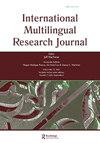成长(无界):韩国第三文化儿童的全球化、流动性和归属感
IF 2.1
1区 文学
Q2 EDUCATION & EDUCATIONAL RESEARCH
引用次数: 1
摘要
这项研究探讨了一个更大的问题,即跨越全球多个社区之间紧张关系的流动抚养如何影响一个人的身份和归属感的构建。在本文中,我研究了在成长期生活在多个国家的年轻人——最突出的是被称为第三文化儿童——如何反思他们的跨国生活轨迹。我特别关注他们对-à-vis语言、读写能力和文化的认同和归属的建构,将资本(布迪厄,1986)和习惯(阿帕杜莱,1996;布迪厄,1991)。我的分析表明,第三种文化的孩子在表达他们的流动成长过程中强调多语言能力和多样性,他们最终选择在美国生活,并在成年后与韩国保持跨国联系。他们对美国的归属感是对韩国社会的疏离感的回应。在韩国社会,他们在社会阶层上享有特权,但由于当地韩国人对民族团结的高度尊重,他们感到被排斥。随着越来越多的跨国社区从全球各地的异质资源中动员知识资金,本研究强调了教育工作者将学生的知识资金纳入语言和识字课程的必要性。本文章由计算机程序翻译,如有差异,请以英文原文为准。
Growing up (un)bounded: globalization, mobility and belonging among Korean third culture kids
ABSTRACT This study speaks to the larger question of how mobile upbringing that spans tensions between multiple communities across the globe influences one’s construction of identity and belonging. In this paper, I examine how young adults who have been living in multiple countries in their formative years- most prominently referred to as Third Culture Kids -reflect upon their transnational life trajectories. With a particular focus on their construction of identity and belonging vis-à-vis language, literacy, and culture, I pair the concept of capital (Bourdieu, 1986) with habitus (Appadurai,1996; Bourdieu,1991). My analyses suggest that Third Culture Kids foregrounded multilingual competence and diversity in articulating their mobile upbringing, and they finally chose to live in the US in addition to maintaining transnational ties with Korea in their adulthood. Their sense of belonging to the US was cultivated as a response to feelings of estrangement from Korean society, where they are privileged in terms of social class but feel excluded due to the high cultural esteem for ethnic solidarity among local Koreans. With the growing number of transnational communities that mobilize funds of knowledge from heterogenic resources across the globe, this study highlights the need for educators to incorporate students’ funds of knowledge into language and literacy curriculum.
求助全文
通过发布文献求助,成功后即可免费获取论文全文。
去求助
来源期刊
CiteScore
4.10
自引率
4.80%
发文量
19
期刊介绍:
The International Multilingual Research Journal (IMRJ) invites scholarly contributions with strong interdisciplinary perspectives to understand and promote bi/multilingualism, bi/multi-literacy, and linguistic democracy. The journal’s focus is on these topics as related to languages other than English as well as dialectal variations of English. It has three thematic emphases: the intersection of language and culture, the dialectics of the local and global, and comparative models within and across contexts. IMRJ is committed to promoting equity, access, and social justice in education, and to offering accessible research and policy analyses to better inform scholars, educators, students, and policy makers. IMRJ is particularly interested in scholarship grounded in interdisciplinary frameworks that offer insights from linguistics, applied linguistics, education, globalization and immigration studies, cultural psychology, linguistic and psychological anthropology, sociolinguistics, literacy studies, post-colonial studies, critical race theory, and critical theory and pedagogy. It seeks theoretical and empirical scholarship with implications for research, policy, and practice. Submissions of research articles based on quantitative, qualitative, and mixed methods are encouraged. The journal includes book reviews and two occasional sections: Perspectives and Research Notes. Perspectives allows for informed debate and exchanges on current issues and hot topics related to bi/multilingualism, bi/multi-literacy, and linguistic democracy from research, practice, and policy perspectives. Research Notes are shorter submissions that provide updates on major research projects and trends in the field.

 求助内容:
求助内容: 应助结果提醒方式:
应助结果提醒方式:


